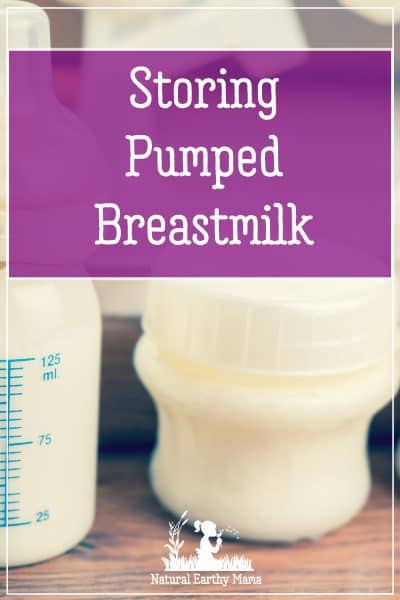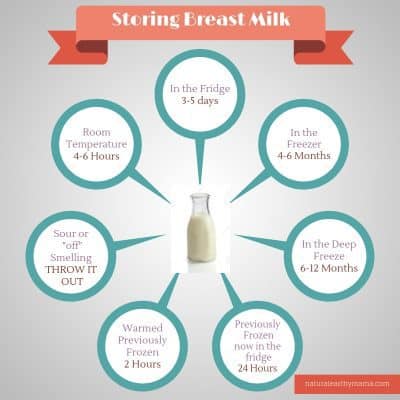 Breast milk is a magical substance, specially designed to feed little humans. It contains anti-bodies and anti-microbial substances, this means that the rules for storing breast milk is a little different to storing formula or pasteurized cows/goats milk.
Breast milk is a magical substance, specially designed to feed little humans. It contains anti-bodies and anti-microbial substances, this means that the rules for storing breast milk is a little different to storing formula or pasteurized cows/goats milk.
These guidelines below are widely accepted as the correct and proper way to keep your precious expressed milk free from bacterial growth and contamination.
Please read: This information is provided for educational purposes only and is not intended to treat, diagnose or prevent any disease. We encourage you to make your own health care decisions in partnership with a qualified health care professional.
This post contains affiliate links, this means at no extra cost to you, we make a commission from sales. Please read
our Disclosure Statement
Immediate Use of Fresh Breastmilk
If you are planning to use the milk right away, freshly expressed milk is good at room temperature for 4-6 hours. If the room is a warmer temperature it is best to discard the milk after 4 hours.
Storing Breastmilk in the Refrigerator
If you don’t need to use your milk immediately, you can safely keep in the fridge. Stored in a sterilized bottle/container in the back of the fridge, the milk is safe for 3-5 days.
Using Frozen Milk
If you don’t think you will use your liquid gold within the 3-5 day time frame – cool it to room temperature, add a date label and pop in the freezer.
By gradually cooling down the milk before freezing you are able to maintain a lot of the natural proteins found in breast milk.
Milk pumped within 3-4 hours of each other can be mixed and frozen together. Milk stored in the freezer is good for up to 6 months. If you have a deep freezer, milk can keep for up to a year.
Once breast milk is frozen, many of the immunological properties it contains are destroyed. These are the same properties that help prevent bacterial growth, which means previously frozen breast milk will go bad faster once it is defrosted than freshly expressed breast milk would.
RELATED POST: Making a breastfeeding basket
How to Thaw Frozen Breastmilk
When thawing frozen milk the same rules apply from the cooling down process when you first pumped it. In order to maintain the composition of breast milk proteins you should gradually heat it.
If possible, take the milk out from the freezer and place it in the fridge to thaw overnight. You can use cold running water to thaw the milk prior to use, gradually increasing the water temperature to warm the milk making sure to massage the bag for an even temperature.
Never place breast milk in the microwave to heat up, it de-natures the proteins and heats it unevenly.
Previously frozen milk can keep in the fridge for up to 24 hours. If a bottle has been heated for a feeding, it can be used withing two hours before discarding.
Can I Refreeze Thawed Breastmilk?
Depending on how cold you keep your fridge/freezer, you may be able to pop the bag back in the freezer.
If your breast milk still has ice crystals it is not technically thawed. Milk that has been left in the fridge, but still has ice crystals, is fine to place back in the freezer.
If your milk is completely liquid, however, you can not refreeze it.
Once you know how to properly express and freeze your breast milk, you will need to know how long it will stay good after you take it out of the freezer.
RELATED POST: Living with low milk supply
How long will thawed breast milk last?
If you let the breast milk thaw out in the fridge, you can keep it in the fridge up to 24 hours after it has finished thawing.
Note: It can take around 12 hours to thaw depending on how much milk is in the container and how cold your fridge is.
If you warmed the thawed breast milk, do not try to hang on to it. Warmed milk is far more likely to have been exposed to bacterial growth.
You can add freshly expressed milk to thawed milk as long as the freshly expressed milk is cooled first and the milk is still used within 24 hours.
If your breast milk ever smells sour or “off”, throw it out.
Double-bag your milk if you’re going to be storing it with something that smells strongly, such as peppers, onions or garlic, as the breast milk may pick up the strong smell.
Remember that your baby’s immune system is not yet fully developed, so we need to protect it the best that we can. Always use sterile bottles for babies under 3 months of age, and if in doubt – throw it out! 
